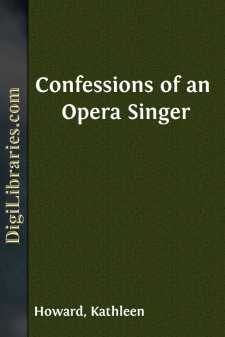Categories
- Antiques & Collectibles 13
- Architecture 36
- Art 48
- Bibles 22
- Biography & Autobiography 813
- Body, Mind & Spirit 142
- Business & Economics 28
- Children's Books 17
- Children's Fiction 14
- Computers 4
- Cooking 94
- Crafts & Hobbies 4
- Drama 346
- Education 46
- Family & Relationships 57
- Fiction 11829
- Games 19
- Gardening 17
- Health & Fitness 34
- History 1377
- House & Home 1
- Humor 147
- Juvenile Fiction 1873
- Juvenile Nonfiction 202
- Language Arts & Disciplines 88
- Law 16
- Literary Collections 686
- Literary Criticism 179
- Mathematics 13
- Medical 41
- Music 40
- Nature 179
- Non-Classifiable 1768
- Performing Arts 7
- Periodicals 1453
- Philosophy 64
- Photography 2
- Poetry 896
- Political Science 203
- Psychology 42
- Reference 154
- Religion 513
- Science 126
- Self-Help 84
- Social Science 81
- Sports & Recreation 34
- Study Aids 3
- Technology & Engineering 59
- Transportation 23
- Travel 463
- True Crime 29
Confessions of an Opera Singer
by: Kathleen Howard
Description:
Excerpt
CHAPTER I
THE WAY IT ALL HAPPENED
I WAS very young and I was engaged to be married. We had just lost our money in rather dramatic fashion, and we were all doing what we could to supply the sudden deficit. My sister began to prepare herself to be a teacher, my brother left his boarding school and came home to go into a friend's office, and I—well, I accepted the hand and heart of the young man in our set with whom I had had most pleasure in dancing in winter and sailing in summer.
My heart didn't lose a beat and turn over when I saw him coming as did those of the heroines in Marion Crawford's novels, but we were the best friends in the world, and I thought that anything else must be a literary exaggeration, put in to make the story more exciting; just as the heroine's eyelashes were usually exaggerated to the abnormal length of an inch to make her more beautiful, though none of the girls I knew had them like that.
He was a young business man, just starting as assistant to his father whose business was an old established, comfortable sort of family affair, big enough to supply, in time, an extra income for an unambitious young couple like ourselves. Every one congratulated us heartily, and I began to embroider towels and hem table napkins and to dream about patterns of flat silver.
The whole arrangement was satisfactory to the point of banality, and I might be quite an old married woman by this time, but—I had a voice.
Nine-tenths of me, at this age, were the normal, rational characteristics of a well-brought up, bright, good looking girl. But the last tenth was an unknown quantity, a great big powerful something which I vaguely felt, even then, to be the master of all the other tenths, a force which was capable of having its own way with the rest of me if I should ever give it a chance. My voice, the agent of this vague power, had developed rather late. It is true that our whole childhood had been coloured by music, that we read notes before we could read letters, and that music was our earliest and most natural mode of expression.
My father's greatest joy in life was music, and he always played imaginative musical games with us in the evenings. The earliest one I remember was when we were tiny tots. He used to improvise on the small organ we had and ask us questions which we had to answer, singing to his accompaniment. I was Admiral Seymour and Marjorie was General Wolsey.
I remember his singing,
"And how would you get your ships along, Admiral,If your sails and oars were shot overboard?"I sang solemnly,
"I'd shubble them along with shubbles."
Afterwards when I began to sing from printed music with him I remember saying one evening as he was playing hymns and unfamiliar English ballads for me to sing,
"Papa, please let me look at the music and follow the notes up and down."
I really began reading music at four years old. We played and sang all our childhood. When Marjorie was seven and I was six we sang Even-song at the village church, as the members of the regular choir were ill or absent. Marjorie had a heavenly childish soprano and I a heavy nondescript voice. But I always pleased my father by singing real "second voice" and not just following the soprano in thirds.
He used to give us a note, and we then had to run round our rather large house humming it. It was the deepest disgrace we ever knew if we had sharped or flatted when we got back to the starting point. He taught us musical terms by making us dance to different rhythms he played, and would call out "Allegro," "Vivace," "Adagio," "Molto allegro," "Legato," and so forth, to which we had to change instantly. Whenever any one came to the house, we played and sang for them, and though it might have been rather awful for the visitors it was very good for us to get used to an audience.
He used to arrange fairy tales like "Bluebeard" in doggerel verses and write accompaniments to them, and we then learned them by heart and rehearsed them, and some grand night played them for all the neighbours....


